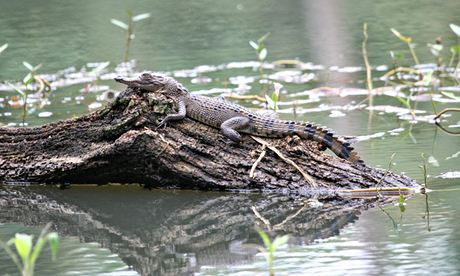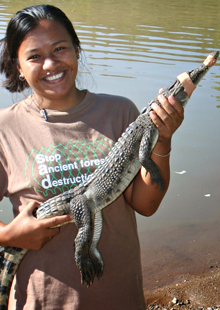Filipino conservationist wins prize for 'rebranding' world's rarest crocodile
Jessica Aldred
theguardian.com
08 May 2014
Marites Gatan Balbas has won a Whitley award for her work involving local communities in the protection of the 'misunderstood' Philippine crocodile
Traditional stories depicted the Philippine crocodile as a large man-eater, farmers saw them as pests and the animal is frequently used as a symbol to represent corrupt politicians. But in reality, she explains, the species is relatively small, shy and friendly and does not attacked unless provoked.
It is her work to change this image through community initiatives that has seen Gatan Balbas recognised with a Whitley Fund for Nature award and helped to bring the Philippine crocodile (Crocodylus mindorensis) back from the brink of extinction.
 A juvenile Philippine crocodile in Dunoy Lake. The species is the world's rarest crocodile. Photograph: courtesy 2014 Whitley Awards
A juvenile Philippine crocodile in Dunoy Lake. The species is the world's rarest crocodile. Photograph: courtesy 2014 Whitley Awards The 40-year-old will share the £280,000 prize money with seven other winners of the "green oscar" awards, which recognise individuals working in grassroots nature conservation in developing countries. This year's prizes range from schemes to encourage farmers to conserve the grassland hunting grounds of the imperial eagle in Bulgaria to a project to promote coexistence between local people and lions in northern Kenya.
Listed as critically endangered by the IUCN and found only in the Philippines, there are only 100 mature Philippine crocodiles estimated to be living in the wild. Little is known about the species, for example, how long an individual lives for, and Gatan Balbas's Mabuwaya Foundation is one of the only organisations to study it.
From world war two to the 1960s, crocodiles in the Philippines were heavily exploited for leather and the pet trade. Today the threats come from the loss of the crocodile's freshwater habitat of marshes, swamps and creeks that are converted for agriculture and the killing of the animals outside protected areas. Hatchling survival is also very low as the species is so sensitive and there are not enough unspoilt water bodies where juvenile crocodiles can mature safely.
Once widely distributed throughout the Philippines, the species is now restricted to northern Luzon Island and south-west Mindanao in the north-east of the archipelago.
"In our country there are organisations that are working to conserve endangered species like the Philippine eagle, the Philippine cockatoo, the green sea turtle and the Isabela oriole. But these are very beautiful species and do not have an image problem – nobody cared about the crocodile and that's why we set up our foundation, because we care. We don't want to crocodile to be extinct, we want to enjoy it," Gatan Balbas says.
 Whitley award winner Marites Gatan Balbas. Photograph: Courtesy 2014 Whitley awards
Whitley award winner Marites Gatan Balbas. Photograph: Courtesy 2014 Whitley awards Gatan Balbas is the deputy director and field project manager of the Mabuwaya Foundation(meaning "long live the crocodile"), set up in 2003, and also a member of the IUCN crocodile specialist group.
The staff of nine plus volunteers have managed to increase the wild population from 12 individuals in 2001 to 109 today, and reduced crocodile killings by humans from 13 in 1998 to just one in 2013.
"That's the power of involving the local communities in the protection programme – it's very effective because they see the ownership and the pride of being involved in the conservation of the species. They say: 'this is our crocodile and we are very proud of it'."
Gatan Balbas explains that a central part of the foundation's work is communication and education campaigns for local communities and government involving lectures, puppet shows, school field trips to crocodile sanctuaries and community consultations. "We believe that communication is the key to gain the respect or the people for the crocodiles. And we believe that campaigns should start from a young age."
Far from the scary monster depicted by the older generation, young children now have a friendly crocodile mascot, fun crocodile puppets and story books to help them understand that crocodiles are not a threat.
Such is the success of the image overhaul in some areas that the slogan in the municipality of San Mariano where the foundation works is now: "Philippine crocodile: something to be proud of."
Gatan Balbas says her work has been helped by a healthy attitude to conservation in the Philippines, where a national act protects all critically endangered species including the crocodile with a penalty of 100,000-1m pesos or a 6 to 12-year jail sentence. The species is also protected by local sanctuaries that prohibit catching, harming or killing the species. "People respect it because they are involved in the development of that law," she says.
As well as creating four locally managed crocodile sanctuaries, with plans for two more, the foundation also runs a "headstart" programme that involves nest-searching and 24-hour guard, collecting the hatchlings and bringing them to the rearing station for 18-24 months, then releasing them back into the wild.
"Winning the Whitley award will help us increase the population of the Philippine crocodile through head-starting and releasing crocodiles and nest-guarding. It will also to strengthen the community-based conservation effort that was initiated years ago so that we can have more nests in the future and more crocodiles in 10 years. Winning this award is a great, great opportunity for us," Gatan Balbas said.
She says Mabuwaya's target is to get the crocodile delisted from its critically endangered status and see a 10% increase in its population each year.
"If we can save the Philippine crocodile when people viewed them as very scary and something to be feared then I believe we can save all other critically endangered species in our country from extinction."
2014 Whitley award winners
All nine winners are being honoured at an award ceremony at the Royal Geographical Society in London on Thursday night that will be attended by the fund's patron, Princess Anne.
Gold award
• Jean Wiener – Haiti
"Lifetime achievement" award for 25 years conserving Haiti's coastal ecosystems and securing its first marine protected areas
Whitley Fund for Nature awards
• Shivani Bhalla – Kenya
Warrior Watch: enabling the coexistence of people and lions in northern Kenya
• Luis Torres – Cuba
Building a national movement to save Cuba's amazing plant life
• Fitryi Pakiding – Indonesia
Uniting coastal communities to secure the Pacific's last stronghold for nesting leatherback turtles
• Marites Gatan-Balbas – Philippines
Taking local action to save the world's rarest crocodile
• Melvin Gumal – Malaysia
Protecting Borneo's iconic great apes: conservation of orangutans in Sarawak
• Stoycho Stoychev – Bulgaria
The imperial eagle as a flagship for conserving the wild grasslands of south-eastern Bulgaria
• Paula Kahumbu – Kenya
Hands off our elephants: delivering African leadership to address Kenya's poaching crisis

No comments:
Post a Comment